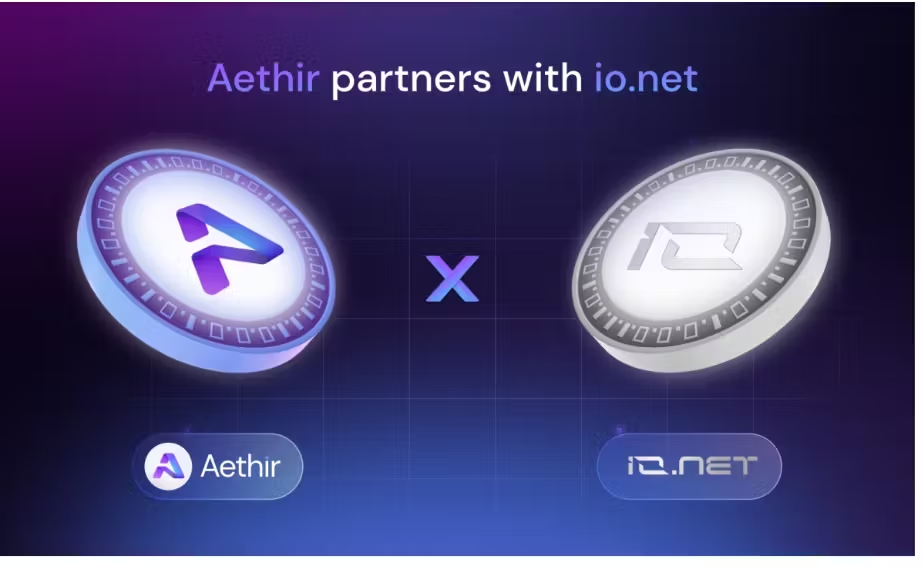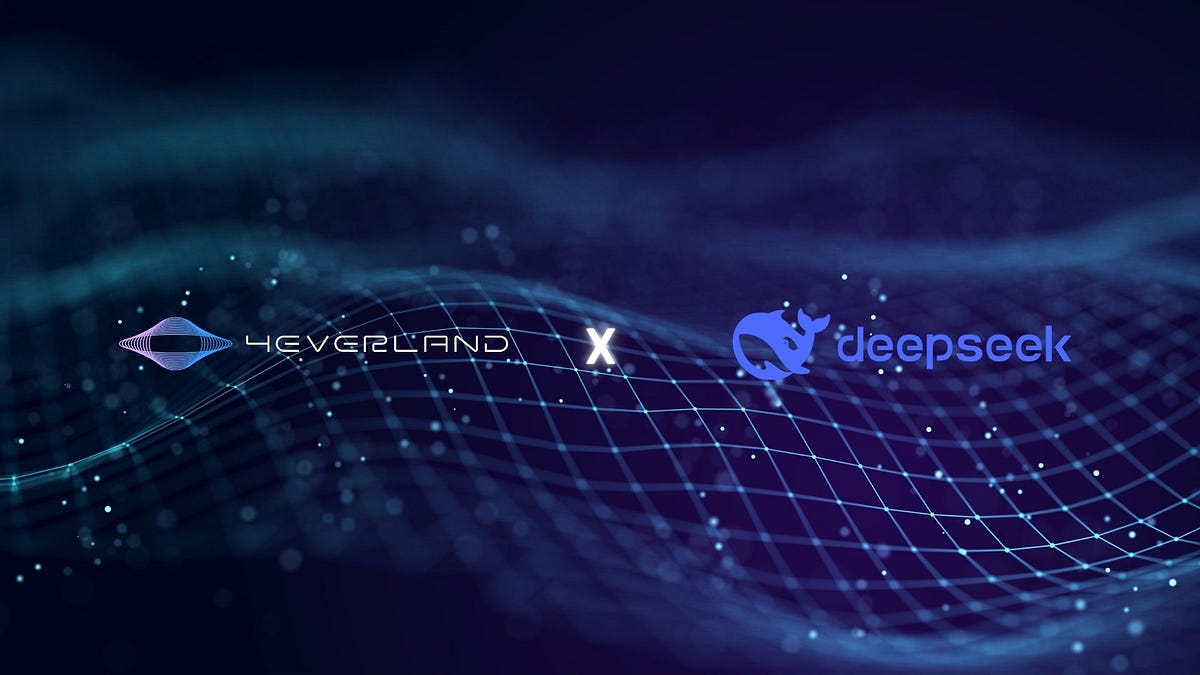Latest DePIN AI News
View AI Projects
2 months ago
SFT Protocol Partners with SOLPEN to Advance AI-Driven Decentralized Infrastructure
SFT Protocol, a prominent player in the Web3 landscape, has announced a strategic partnership with SOLPEN, an AI-driven DePIN ecosystem based on the Solana blockchain. This collaboration aims to redefine the interaction between decentralized AI networks and the Internet of Things (IoT), thereby strengthening the connection between Web3 technology and physical infrastructure. The initiative was revealed through SFT Protocol's official social media channels, highlighting the significance of this merger in advancing the capabilities of both platforms.
The partnership is set to merge SFT Protocol's robust solutions for DePIN infrastructure with SOLPEN's cutting-edge AI-driven wearable technology. This integration is expected to create a decentralized ecosystem that operates with low latency and high efficiency. By leveraging decentralized data processing and AI analytics, the collaboration promises to enhance real-world applications significantly. SFT Protocol has established itself as a key player in the DePIN ecosystem, focusing on blockchain-based infrastructure that supports seamless real-world applications, thus driving the broader adoption of Web3 technologies.
Furthermore, the collaboration benefits from Solana's high-performance blockchain, which facilitates unparalleled integration across various Web3 platforms. By setting new standards for decentralized infrastructure, both SFT Protocol and SOLPEN are enhancing the practicality and accessibility of their offerings. As they continue to evolve, this partnership is poised to lead towards a smarter, AI-integrated Web3 network, paving the way for innovative solutions in the decentralized landscape.

2 months ago
New Jersey Devils Launch AI Chatbot 'Bott Stevens' for Enhanced Fan Engagement
The New Jersey Devils have introduced a groundbreaking AI chatbot named "Bott Stevens," aimed at enhancing digital fan engagement. This innovative chatbot is named after the legendary Devils player Scott Stevens and is powered by Theta EdgeCloud's decentralized AI infrastructure. Scheduled to launch during the 2024-25 NHL season, Bott Stevens will be accessible on the team's official website, providing fans with real-time information on game schedules, ticket sales, statistics, and merchandise. Utilizing Theta's Retrieval Augmented Generation technology, the chatbot will ensure data accuracy by sourcing information from official NHL channels, thereby minimizing the risk of misinformation from unverified sources.
Bott Stevens boasts impressive computational capabilities, leveraging Theta EdgeCloud's network of over 30,000 edge nodes and distributed GPUs, which collectively offer more than 80 PetaFLOPS of processing power. This robust infrastructure is designed to handle peak demand, particularly during high-stakes events like playoffs or significant team announcements. In addition to answering fan inquiries, the chatbot will provide historical highlights, game recaps, venue information, and updates on team events. Future enhancements may include predictive analytics for fantasy sports and interactive tools to further engage fans.
To promote Bott Stevens, the Devils plan to integrate its capabilities across multiple platforms, encouraging fan interaction and awareness. The chatbot will not only deliver statistics and schedules but also curated content that enriches the fan experience, such as historical highlights and information about upcoming events. Success metrics will include user engagement rates, accuracy of information, and feedback from fans, ensuring that Bott Stevens remains a valuable resource for the Devils' community. By focusing on continuous learning and personalized interactions, the team aims to differentiate Bott Stevens from other AI agents, creating a unique and engaging experience for fans.

2 months ago
Revolutionizing Confidential AI with Intel TDX and iExec
The landscape of Confidential AI is undergoing a significant transformation, primarily driven by the introduction of Intel® Trust Domain Extensions (Intel® TDX). For years, developers faced challenges when trying to secure AI workloads using Intel SGX, which often required extensive modifications to applications and led to compatibility issues. This cumbersome process not only wasted time but also hindered the real-world adoption of Confidential AI solutions. However, with Intel TDX, developers can now run AI workloads in secure virtual machines without needing to rewrite their code, thereby streamlining the development process and enhancing performance.
Intel TDX is designed to create a hardware-isolated trusted execution environment (TEE) that enhances data confidentiality and integrity in virtualized environments. Built into Intel’s 4th Generation Xeon® Scalable processors, TDX introduces Trust Domains that isolate virtual machines from the hypervisor and even cloud service providers. This isolation is crucial for AI applications that handle sensitive datasets and proprietary models, as it significantly reduces the attack surface while maintaining high performance. Additionally, TDX is optimized for AI workloads, leveraging advanced CPU capabilities to accelerate deep learning and machine learning models, making it a robust choice for developers.
The collaboration between Intel TDX and iExec is paving the way for a new era of Confidential AI. As a Gold Member of the Intel Partner Alliance, iExec is at the forefront of this movement, providing solutions that enable secure, decentralized, and scalable execution of AI workloads. This partnership not only enhances the security of AI computations but also ensures compliance with data protection regulations. With practical applications in sectors like healthcare and finance, iExec empowers developers to build privacy-preserving AI applications that prioritize data ownership and secure computing, ultimately leading to a more trustworthy AI ecosystem.

2 months ago
AI Cryptocurrencies Bittensor and IntelMarkets Show Promising Growth Potential
AI-driven cryptocurrencies like Bittensor and IntelMarkets are experiencing a significant surge, with last month's impressive 40% increase drawing attention from analysts. The growing adoption of artificial intelligence and decentralized intelligence has positioned both TAO and INTL tokens for potential substantial growth. Investors are left to ponder whether this is merely the onset of a larger movement in the crypto space, particularly as Bittensor's recent developments suggest a promising future.
Bittensor's TAO token has recently gained traction in the DeFi AI sector, although it remains within a descending price channel. A minor bullish engulfing pattern has emerged, hinting at a possible breakout. Factors contributing to this optimism include President Trump's substantial investment plan for AI, which, despite focusing on centralized solutions, may elevate discussions around decentralized AI, where Bittensor is making strides. Additionally, a partnership between Zuvu AI and Vana aims to enhance decentralized AI within Bittensor, potentially paving the way for TAO to reach the ambitious $1,000 mark under favorable market conditions.
On the other hand, IntelMarkets is democratizing access to AI tools for everyday traders, previously available only to hedge funds. By providing advanced trading bots and real-time alerts, IntelMarkets empowers small traders to make informed decisions. The platform also emphasizes education, offering resources to simplify complex investment strategies. With its robust security system, Codeum, IntelMarkets ensures user assets remain protected. Currently in Stage 10 of its presale, the INTL token is priced attractively at $0.092, with predictions suggesting it could rival Bittensor's market cap, offering early investors a potential 20,000% return on investment.

2 months ago
iExec's Decentralized Confidential Computing: A Solution for Web3 Privacy Challenges
The Web3 revolution has brought forth promises of enhanced ownership, transparency, and security for users. However, a significant challenge remains: the issue of data privacy and security. Blockchain technology, while offering pseudonymity, records every transaction on a public ledger, which means that true privacy is elusive. Through extensive on-chain analysis, individuals can be traced, exposing them to potential tracking and security threats. To genuinely realize the vision of Web3, developers must prioritize the integration of privacy-centric solutions that safeguard user data while upholding transparency and security.
One of the critical vulnerabilities in Web3 is the handling of data in use. Traditional security measures often focus on data at rest or in transit, neglecting the sensitive data actively processed by applications. Without proper protection, this data remains unencrypted in memory, making it susceptible to breaches and unauthorized access. iExec is addressing this issue with its innovative Decentralized Confidential Computing (DeCC) approach, which combines the decentralization of blockchain with hardware-based security to protect data in use, thus enabling users to maintain ownership and monetize their information securely.
iExec's protocol integrates off-chain confidential computing with on-chain blockchain security through its Proof of Contribution (POCO) smart contracts. This synergy allows developers to create trust-driven decentralized applications (dApps) that manage sensitive data without exposing it to third parties. Tools such as DataProtector and Web3Mail empower developers to encrypt data, manage access dynamically, and monetize digital assets while ensuring privacy. As AI development continues to face challenges regarding data privacy and fair compensation for contributors, iExec's Confidential AI solutions promise secure and scalable workflows, ensuring that data contributors retain control and value in the evolving landscape of Web3.

2 months ago
StrikeBit Partners with Aethir to Enhance AI Development
StrikeBit has recently announced a strategic partnership with Aethir, aimed at providing AI developers with the necessary computing resources to develop and scale AI agents efficiently. This collaboration integrates StrikeBit's advanced technology with Aethir's decentralized GPU computing infrastructure, ensuring secure and effective AI development and deployment. StrikeBit, a cryptocurrency trading platform, utilizes AI agents to analyze market trends and implement strategies, thus creating new investment opportunities for crypto users.
Aethir stands out as a decentralized GPU computing platform that offers high-performance cloud infrastructure, enabling businesses to access powerful GPUs for various applications, including AI models and gaming. The partnership is particularly significant as it allows StrikeBit's AI developers to leverage Aethir's efficient GPU technology, which is crucial for processing vast amounts of data and refining AI products. This integration not only enhances the capabilities of StrikeBit's AI agents but also ensures that the development process remains cost-effective and accessible for smaller teams.
The implications of this partnership are profound. By utilizing Aethir's decentralized computing power, StrikeBit is fostering an ecosystem that prioritizes privacy, accessibility, and ownership while delivering high-performing computing resources. This collaboration eliminates the reliance on traditional centralized cloud services, which can be prohibitively expensive. As a result, StrikeBit's AI developers can expedite their workflows, expand their operations, and explore new opportunities without the usual constraints, ultimately transforming the landscape of AI development in the cryptocurrency space.

2 months ago
io.net and Aethir Collaborate to Enhance Decentralized GPU Computing
In a significant move for the decentralized computing landscape, io.net and Aethir have announced a strategic collaboration aimed at enhancing GPU access and performance for applications in AI, machine learning, and gaming. By integrating io.net's advanced virtualization technology with Aethir's enterprise-grade distributed GPU cloud, the partnership seeks to create a robust, low-latency, and cost-effective solution tailored for GPU-intensive workloads. This collaboration comes at a time when the demand for GPU computing is surging, with projections indicating that the market could quadruple in size by 2030.
The alliance between io.net and Aethir is designed to provide a highly scalable and efficient solution to meet the growing global demand for GPU resources. io.net’s cutting-edge virtualization and orchestration capabilities will enable AI and machine learning engineers to deploy Ray and Kubernetes clusters seamlessly across a network of over 600,000 decentralized GPUs and CPUs. Meanwhile, Aethir's distributed cloud infrastructure is set to deliver enterprise clients in the AI, machine learning, and gaming sectors with fast and scalable GPU cloud resources, leveraging a network of over 40,000 high-performance GPUs, including 3,000 NVIDIA H100s.
Under the terms of this collaboration, both companies will integrate their ecosystems to offer customers a seamless GPU computing experience across various workloads, including clustering and serverless inferencing. This reciprocal integration will allow io.net’s clustering solutions to be accessible on Aethir’s platform, providing enterprises with a diverse range of GPU-based computing options. Additionally, both companies plan to collaborate on marketing and community initiatives, further enhancing the overall ecosystem. As part of their partnership, an airdrop will distribute $50 million worth of tokens to community members of both platforms, marking a significant milestone in their joint mission to democratize high-performance compute access for all.

2 months ago
Simplifying Web3: Overcoming Usability Challenges for Broader Adoption
Web3 technology is experiencing significant growth, yet its complexity remains a major barrier to mainstream adoption. In the latest episode of the podcast "Hashing It Out," host Elisha Owusu Akyaw engages with Moe El-Shibib and Selim Sezgin, co-founders of Ponder One, to discuss the pressing usability challenges that hinder user engagement. They highlight that while technical advancements in blockchain are impressive, they have outpaced the user experience, making it difficult for newcomers to navigate decentralized finance (DeFi) platforms and manage assets across various chains. The conversation emphasizes the need for a more user-friendly approach to Web3.
To tackle these usability issues, the episode explores innovative AI-driven solutions that can streamline blockchain transactions. By automating processes such as swaps and bridging, AI can significantly reduce the technical knowledge required from users, making interactions more intuitive. Additionally, the discussion touches on the importance of cross-chain functionality, which allows users to interact across different blockchains seamlessly, thus eliminating the cumbersome task of manually switching networks. This focus on simplifying the user experience is crucial for fostering broader adoption of Web3 technologies.
The conversation also delves into the role of decentralized governance in shaping Web3 applications. The Ponder One team stresses the importance of community-driven decision-making, where users can vote on integrations and protocol developments. However, they caution that governance structures must find a balance between decentralization and efficiency to remain effective. As the industry progresses towards integrating real-world assets (RWAs) and enhancing accessibility to DeFi, the future of Web3 will depend on simplifying blockchain technology for everyday users, ensuring a more inclusive ecosystem for all.

2 months ago
4EVERLAND AI RPC and 4EVER Chat: A New Era in AI Model Integration
The recent integration of 4EVER Chat into the Awesome DeepSeek Integration represents a pivotal advancement for the 4EVERLAND AI RPC infrastructure. This collaboration establishes AI RPC as a "highway for models," enabling developers to access both DeepSeek and over 200 large language models (LLMs) through a single API. With industry-leading stability and speed, 4EVERLAND AI RPC enhances the DeepSeek model by providing an enterprise-grade decentralized network layer. Furthermore, 4EVER Chat stands out as the first AI Agent framework that supports multi-chain private interactions, allowing developers to create compliant AI applications without depending on third-party services. This integration signifies a significant convergence of Web3 and AI infrastructure, offering developers seamless access to the DeepSeek model while challenging the dominance of traditional cloud computing giants in AI computation power.
In the current landscape of artificial intelligence and big data, the multitude of AI models available can make it challenging for developers to choose the right one for their specific needs. The complexities involved in deploying large-scale open-source LLMs can also hinder market entry. 4EVERLAND addresses these challenges by providing a standardized AI RPC API that simplifies the integration of AI functionalities into applications. This streamlined approach allows businesses to enhance their services, improve operational efficiency, and deliver personalized user experiences through tailored AI solutions. By utilizing AI RPC, enterprises can significantly reduce the complexities associated with deploying LLMs, making it an essential tool for enhancing applications, services, or research projects.
The integration of AI RPC and 4EVER Chat aims to create an ecosystem akin to an "electric grid" for AI applications. Developers gain on-demand access to LLM capabilities without the need for in-house infrastructure, while model providers like DeepSeek function as "power plants," generating revenue through network effects. This innovative approach allows enterprises to shift from self-sufficiency to leveraging an intelligent grid, focusing on innovation rather than operational burdens. By standardizing model deployment and emphasizing cost-efficiency and performance optimization, 4EVERLAND and DeepSeek are democratizing access to AI, making LLMs more accessible to developers across various sectors.

2 months ago
Render Network Explores Decentralized AI Innovations at ETH Denver 2025
The Render Network has made significant strides in decentralized AI and DePIN (decentralized physical infrastructure networks) at ETH Denver 2025. This event underscored the increasing relevance of decentralized AI in real-world applications, with Render Network leading discussions on the integration of blockchain, AI, and decentralized computing. A highlight was the co-hosted event "DeAI Day: Dawn of the Agents," where industry leaders such as MorpheusAI and VeniceAI convened to explore the synergy between DePIN and decentralized AI protocols, particularly focusing on the emergence of on-chain AI agents. Trevor Harries-Jones from Render emphasized the efficiency of distributed GPUs in managing AI workloads, thereby enhancing accessibility for decentralized AI development.
During the mainstage discussions, Render Network's AI scout, Paul Roales, participated in a panel titled "Bitcoin for AI: The Poster Children Catalyzing Decentralized Intelligence." This panel highlighted the critical role of decentralized computing in the AI economy, particularly in powering on-chain agents and scaling consumer AI applications. Roales pointed out the growing capabilities of consumer GPUs, which are essential for democratizing access to AI technologies. The discussions also included Render Network's participation in IoTeX’s "DePIN ❤️ AI" event, where Phil Gara elaborated on the transformative impact of decentralized infrastructure on various sectors, including AI, gaming, and finance.
The conversations at ETH Denver extended to envisioning the future of DeAI and AI agents. Tristan Relly from Render Foundation stressed the importance of decentralization in keeping AI models open and accessible, while Gara highlighted how DePINs could foster user-owned AI systems through token incentives. Looking ahead, Render Network is gearing up for RenderCon 2025, where they will further explore the intersections of 3D technology, AI, and GPU computing, featuring insights from industry leaders on the future of creativity and technology integration.
Signup for latest DePIN news and updates